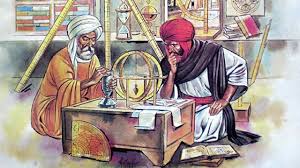Inventions of Muslims
Inventions of Muslims throughout history have made profound contributions across various fields, ranging from mathematics and astronomy to medicine, engineering, and beyond.
Here’s a detailed exploration of some key figures and their inventions:
1. Mathematics and Astronomy:
Muhammad ibn Musa al-Khwarizmi (c. 780-850): Often referred to as the Father
of Algebra, al-Khwarizmi’s work on algebra and algorithms laid the foundation for mathematical thinking in the Islamic world and beyond. His book Kitab al-Jabr wal-
Muqabala introduced systematic solving of linear and quadratic equations.
Thabit ibn Qurra (826-901): A mathematician, astronomer, and physician, ibn Qurra
made significant contributions to number theory, geometry, and astronomy. He translated many ancient Greek mathematical and scientific texts into Arabic, preserving and building upon the knowledge of earlier civilizations.
2. Medicine and Pharmacology:
Ibn Sina (Avicenna) (980-1037): Known as one of the most influential philosophers
and physicians of the Islamic Golden Age, Ibn Sina wrote the Canon of Medicine, an encyclopedia of medicine that became a standard textbook in Europe and the Islamic
world for centuries. His contributions to pharmacology, anatomy, and medical theory
were groundbreaking.
Ibn al-Nafis (1213-1288): A physician who made significant advances in understanding the circulatory system. He described the pulmonary circulation of blood, centuries before it was in Europe.
3. Engineering and Technology:
Banu Musa Brothers (9th century): A trio of brothers—Muhammad, Ahmad, and Hasan—who were scholars, inventors, and engineers in Baghdad. They wrote the Book of Ingenious Devices, which detailed various mechanical devices and automata, demonstrating their advanced knowledge of mechanics and engineering.
Al-Jazari (1136-1206): An engineer and polymath who wrote the Book of Knowledge of Ingenious Mechanical Devices. Al-Jazari’s work included designs for clocks, pumps, and other mechanical devices, showcasing his innovative approach to engineering.
4. Geography and Navigation:
Ibn Battuta (1304-1369): A Moroccan explorer known for his extensive travels throughout the Islamic world and beyond. His writings, particularly the Rihla (The Journey), provide valuable insights into medieval geography, culture, and societal structures across Africa, Asia, and Europe.
5. Chemistry and Alchemy:
Jabir ibn Hayyan (Geber) (c. 721-815): A polymath known for his contributions to chemistry, alchemy, and early forms of experimental chemistry. Jabir developed many chemical processes and apparatus, and his works influenced the development of chemistry in both the Islamic world and Europe.
6. Architecture and Urban Planning:
Ustad Ahmad Lahauri (c. 17th century): The chief architect of the Taj Mahal, a masterpiece of Mughal architecture in India. His innovative use of symmetry, Islamic architectural elements, and meticulous planning made the Taj Mahal a symbol of architectural excellence.
7. Literature and Philosophy:
Ibn Rushd (Averroes) (1126-1198): A philosopher, jurist, and physician who wrote extensively on philosophy, theology, and law. His commentaries on the works of Aristotle had a profound impact on medieval European thought during the Renaissance.
These inventors and scholars represent just a fraction of the contributions made by Muslims throughout history. Their innovations not only advanced scientific and technological knowledge but also facilitated cultural exchange and the preservation of ancient wisdom. The Islamic Golden Age, in particular, marked a period of significant advancement in various fields, laying the groundwork for many modern disciplines.
Through their pioneering spirit and dedication to knowledge, Muslim inventors have left an enduring legacy that continues to inspire and shape our world today.


































